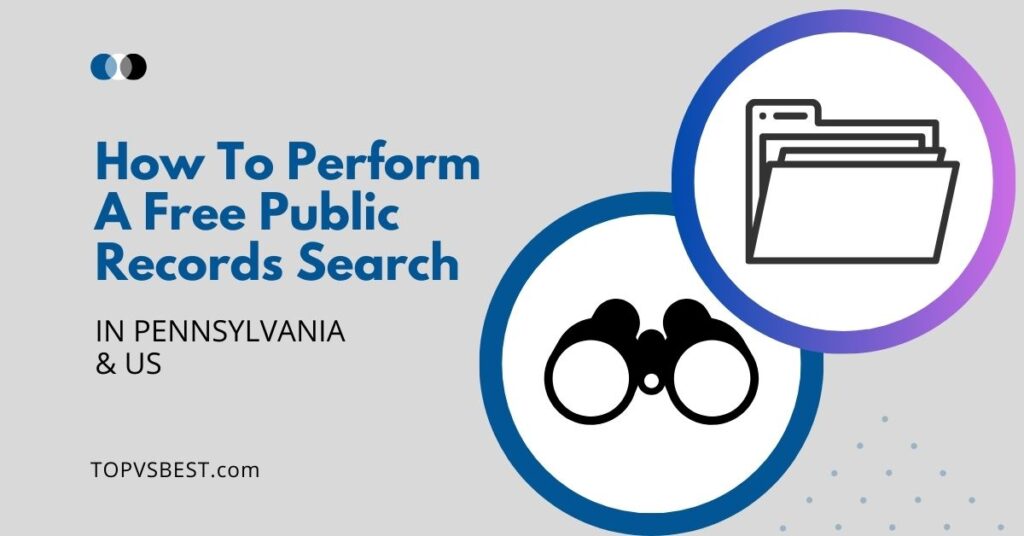Overview
In an age where information is readily available at our fingertips, the power of accessing public records has become a valuable tool for various purposes.
Whether you’re a curious individual, a legal professional, or someone seeking specific information, free public records searches open up many possibilities.
In this guide, we will explore the best ways to navigate these resources, understand what records are public in the US in general (with examples in Pennsylvania), and discover the steps to access criminal records and dockets.
Let’s dive into the world of free public records searches and uncover the wealth of information they offer.
What Are Public Records?
Public records are official documents and information that are available for public inspection and retrieval.
Government agencies and organizations maintain these records, which are crucial for ensuring transparency and accountability in various government and legal processes.
Are They Free?
Access to public records is typically free, but it may vary depending on the source and the specific record you’re requesting.
Some government agencies provide free online access to public records, while others may charge nominal fees for copies or searches.
What Are They Used For?
Public records serve various purposes, including conducting background checks, researching property ownership, obtaining legal information, and gaining insights into government activities.
They are valuable resources for individuals and professionals seeking information for personal or professional reasons.
Who Can Access Them?
Public records are generally accessible to the general public, allowing citizens to review and obtain information related to government activities, legal cases, and more.
Access to public records is often governed by laws and regulations to balance transparency with privacy and security concerns.
Other Relevant Information:
- Public records can encompass a wide range of documents, including court case information, property records, government reports, and more.
- Many government agencies and organizations provide online access to public records, making it convenient for the public to search and retrieve information.
- Online search tools and directories are available to help individuals search for public records from various sources, including those in the U.S., Canada, and worldwide.
- While public records are generally accessible, some information may be restricted or confidential by law, depending on the nature of the record and specific regulations. It’s essential to be aware of the limits on public access to certain information.
- Using public records responsibly and in compliance with relevant laws and regulations is important to ensure the privacy and security of individuals and organizations mentioned in the records.

How To Look Up Public Records
To look up public records in different states, including Pennsylvania, you can use various resources and websites that provide access to these records.
Let’s focus on Pennsylvania as an example and list some resources mentioned in the text:
- Unified Judicial System of Pennsylvania:
- Website: Unified Judicial System of Pennsylvania
- This official website allows you to search and view individual court case information, including docket sheets, for free. It’s an excellent resource for accessing court-related public records in Pennsylvania.
- ThePublicIndex:
- Website: Pennsylvania Public Records Online – ThePublicIndex
- Pennsylvania court records are easily accessible to the public through this website. You can obtain these records from the court clerk in the county. It’s a valuable resource for obtaining court-related public records.
- RecordsPage:
- Website: Search Pennsylvania (PA) Public Records & Databases
- RecordsPage offers free access to various public records and databases in Pennsylvania, making it a useful platform for finding a wide range of public records, including criminal records.
- Public Record Center:
- Website: Free Pennsylvania Public Records
- Public Record Center is a source for free Pennsylvania public record searches, including criminal records and sex offender lookups. It’s a valuable resource for performing background checks and accessing related public records.
How Much It Costs
The cost of accessing public records may vary depending on the source and the specific record you’re interested in.
However, some of the resources mentioned above offer free access to public records in Pennsylvania, ensuring that certain records can be obtained without cost. It’s important to check with the specific resource you’re using for any potential fees associated with particular records.
Other Relevant Information:
- Public records are documents or information that are not considered confidential and pertain to the conduct of government activities.
- Pennsylvania has a statutory right to inspect public records using the state’s Right-to-Know (RTK) Law, ensuring transparency and access to government records.
- The PA Office of Open Records plays a crucial role in holding the government accountable by providing access to records and information to the public.
In summary, public records can be accessed in Pennsylvania and other states through official government websites and specialized online platforms.
Many of these resources offer free access to various types of public records, ensuring transparency and accountability in government operations.
When accessing public records, it’s essential to follow any relevant laws and regulations and be aware of potential costs associated with specific records.
Free Public Records Search: FAQs
The best free public records search tool may vary depending on your specific needs and location. Some popular and reliable options include websites like PublicRecordsNow, Search Public Records, the National Archives, state-specific government portals, and TruthFinder. It’s essential to consider the features, accuracy, and coverage of the service to determine the best one for your requirements.
In Pennsylvania, various records are considered public, including birth and death certificates, marriage and divorce records, property records, court records, criminal records, and more. These records are typically accessible to the public, but there may be some exceptions or restrictions based on privacy and legal considerations.
You can request a criminal record check in Pennsylvania through the Pennsylvania State Police’s Criminal Record Check system. This system provides access to criminal history records, but typically, you would need the individual’s consent or a valid reason, such as employment or background checks, to access their criminal record.
To find criminal dockets in Pennsylvania, you can typically search through the Pennsylvania Unified Judicial System’s web portal, known as “Pennsylvania’s Unified Judicial System Web Docket Sheets.” This online resource allows you to search and view criminal dockets, including case details, court records, and information related to criminal proceedings.
Please note that accessing certain types of records, especially criminal records, may require adhering to privacy laws and regulations and, in some cases, consent from the person whose records you are trying to access. Always follow legal and ethical guidelines when searching for public records.
To learn more about performing public records searches conveniently with TruthFinder, click here.
Conclusion
In this guide, we have explored finding the best free public records search tools, understanding what records are public, accessing criminal records, and reviewing criminal dockets, which are all within reach.
But remember, always ensure you follow the legal guidelines, respect privacy, and use the information you discover responsibly.
With these tools and knowledge in hand, you can harness the vast potential of public records for your personal or professional needs. Happy searching!
In this guide, we will explore the best ways to perform free public records searches, navigate various resources, and understand what records are public.
All product names, logos, brands, trademarks and registered trademarks are property of their respective owners.


